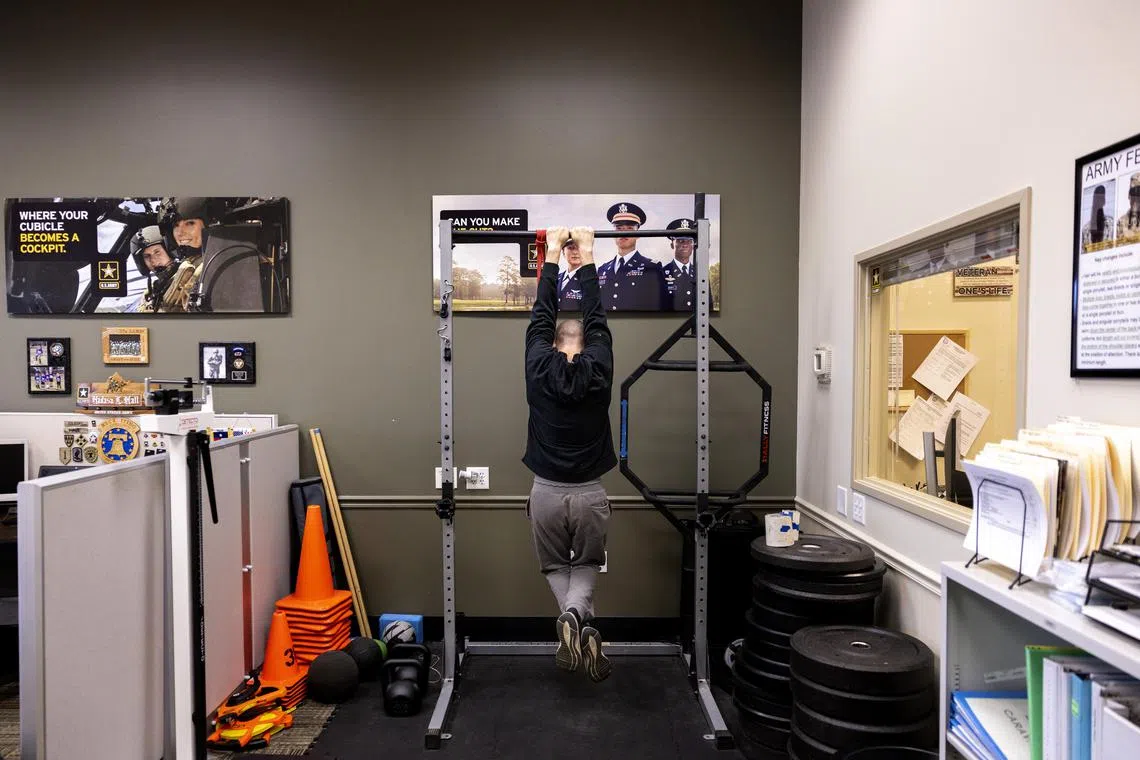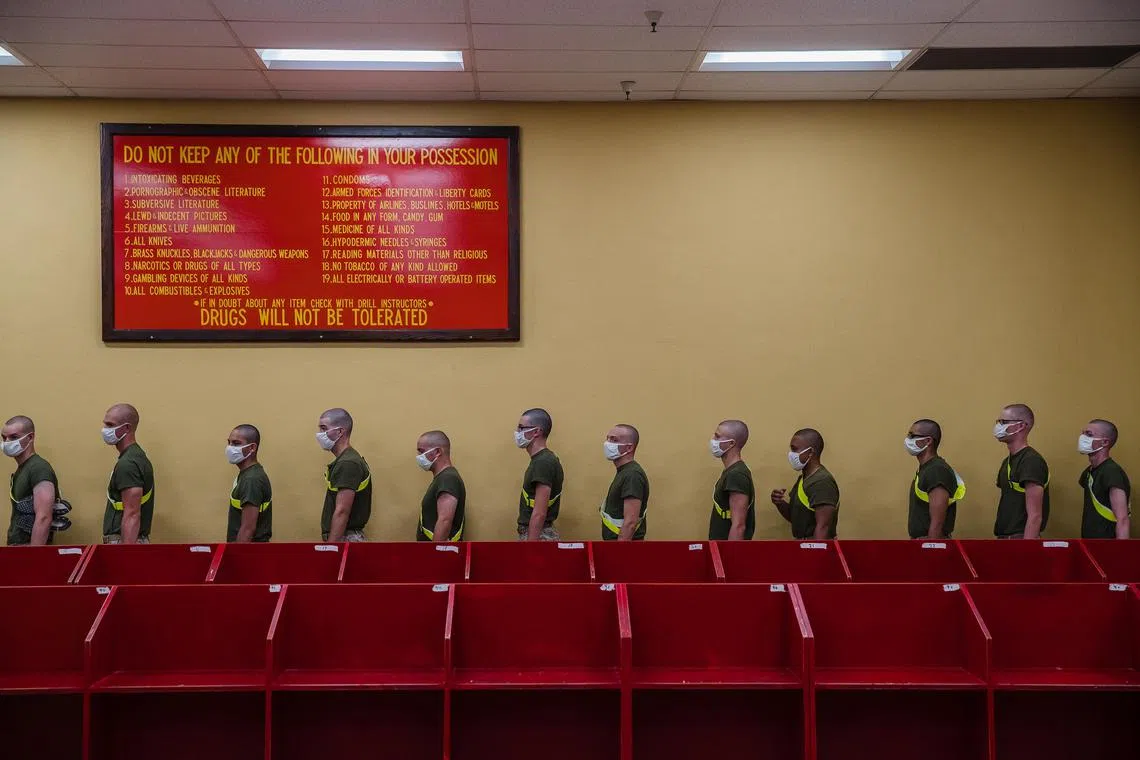Needing younger workers, US federal officials relax rules on past drug use
Sign up now: Get ST's newsletters delivered to your inbox

Recreational marijuana is lawful in 22 states as well as the nation’s capital but remains illegal under federal law.
PHOTO: NYTIMES
Follow topic:
UNITED STATES – Not long ago, urinating in a cup for a drug test was a widely accepted, if annoying, requirement to start a new job. The legalisation of marijuana in more and more states in recent years upended that, prompting many employers to shelve hiring rules from the “Just Say No” era.
There was a major holdout: the federal government, by far the nation’s largest employer.
But now, it too is significantly relaxing drug screening rules as agencies struggle to replenish the ranks of a rapidly ageing workforce in a tight job market.
During the past five years, the United States military gave more than 3,400 new recruits who failed a drug test on their first day a grace period to try again, according to data obtained through a Freedom of Information Act request. Agencies like the Central Intelligence Agency (CIA) and the Federal Bureau of Investigation (FBI) have adopted more lenient rules regarding past use of marijuana among job candidates, officials acknowledge.
And, later in 2023, the Biden administration is expected to take another major step, scaling back how deeply the government delves into the drug histories of people applying for a security clearance.
Polls show that more than half of Americans have used marijuana recreationally or medicinally and that a majority believe it should be legal. Medical cannabis use is legal in 38 states and the District of Columbia. Recreational marijuana is lawful in 22 states as well as the United States’ capital but remains illegal under federal law.
“We don’t want to be disqualifying half of the population, tens of millions of people, for having done something that most of our recent presidents have done,” said Representative Jamie Raskin, who has introduced legislation that would deem marijuana use immaterial in security clearance reviews required for many federal jobs. “You’re taking huge numbers of people off the field.”
Once hired, federal employees remain barred from using drugs including marijuana, even in states that have legalised it. And while there is broad support for more permissive hiring policies regarding past marijuana use, the shifting rules have critics.
When General David H. Berger became the commandant of the Marine Corps in 2019, he expressed concern about how prevalent drug use had become among marines.
“I remain troubled by the extent to which drug abuse is a characteristic of new recruits, and the fact the vast majority of recruits require drug waivers for enlistment,” he wrote in a report on the state of the Marine Corps.
The marines declined to provide specific data on drug waivers for enlistment.
Until recently, admitting recent drug use was disqualifying for many roles. But even some of the government’s most selective agencies have loosened their rules as part of a patchwork of policies that have gone largely unnoticed outside of the federal government.
The CIA, for instance, began telling applicants in April 2022 that they needed to refrain from using marijuana for just 90 days before submitting an application, shortening its previous one-year eligibility requirement. In 2021, the FBI reduced its marijuana abstention requirement for those seeking employment to one year from three.
In December 2021, Ms Avril D. Haines, the director of national intelligence, issued a memo stating that past recreational marijuana use ought to be regarded as “relevant”, but “not determinative”, in deciding a person’s suitability for sensitive national security work.
And in late 2022, at the urging of senior national security officials, the Office of Personnel Management put forward a proposed overhaul of the security clearance vetting process that would effectively stop regarding people who previously used marijuana as a security risk.
Currently, people applying for a security clearance must disclose a detailed account of their use of illegal drugs during the past seven years. Background checks to issue security clearances explore whether an applicant has been truthful about drug use.
Under the proposed new rules, the government would limit that time frame to five years for drugs other than marijuana, and applicants would be asked to disclose marijuana use only during the 90 days before they sought the job.
The government competes for talent with the private sector, which often offers better salaries, more opportunities for remote work and, increasingly, a laissez-faire approach to drug use that does not affect job performance.
Military recruiters ask prospective service members about their alcohol and drug use and are instructed to disqualify those with substance abuse problems – current or past. A key hurdle comes when recruits take a drug test at a military entrance processing station as they officially join. For years, failing that test usually meant getting kicked out on the first day.
In 2022, 4,710 recruits failed their entry drug tests, a nearly 33 per cent increase from 2020, according to military data.

Marine recruits at the Marine Corps Recruit Depot in San Diego on Oct 8, 2020.
PHOTO: NYTIMES
Between 2018 and 2022, the Army granted waivers to more than 3,300 recruits who failed a drug test or admitted past drug use that technically made them ineligible, according to Army data. The Army has historically been more lenient with waivers than the other services.
The Navy, which had a zero-tolerance policy for those who failed an entry drug test, launched a pilot programme in 2021 that allowed recruits the chance to take a second test after 90 days. Over the past three years, the Navy said it has issued drug waivers to 1,375 recruits.
“We recognise that changes in state laws concerning marijuana around the country mean that a portion of our target demographic of 17- to 24-year-olds are more likely to have used THC,” Navy spokesman Dave Benham said, referring to the active ingredient in marijuana, tetrahydrocannabinol.
The Marine Corps and Air Force also recently began allowing recruits a second opportunity to take drug tests. Military officials said the policies should not be construed as a more permissive stance on drug use once people are in the service. Federal workers are subject to random drug tests, and individual agencies have significant leeway in how often they require them.
“Simply because we have a waiver process, we’re not lowering our qualifications,” said Master Sergeant Brandon S. Reid of the Air Force, who oversees a team of recruiters in New York City.
Master Sgt Reid’s team recently allowed a highly qualified recruit who had signed up for a hard-to-fill mechanic role to take a second test after he failed a first one.
The recruit told Air Force officials that he had been in an unventilated basement with a friend who was smoking marijuana, an account that was deemed credible, Master Sgt Reid said, and the recruit passed the second test.
“It ended up being a win-win for the Air Force because we got a high-quality recruit who was motivated and honest throughout the process,” he said.
Since 2018, the vast majority of military recruits allowed to retake a drug test passed a second one, according to data from the military.
Dr Beth J. Asch, an economist at the Rand Corp, which conducts research for the Defence Department, said there was a common assumption that service members who enter the military after obtaining waivers are sub-par recruits. But a 2021 study she led looking at the career outcomes of all soldiers who received waivers between 2001 and 2012 showed that those with a history of drug use performed no worse than their peers.
“Leaders in the military are well aware that legalisation is happening and attitudes have become more tolerant,” Dr Asch said. “My sense is they will try to take leniency to the extent they can while still being consistent with federal law.” NYT

